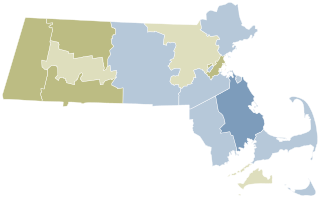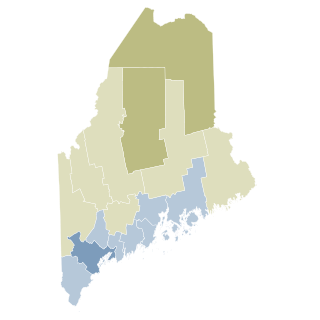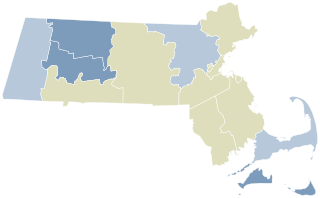In the politics of the United States, the process of initiatives and referendums allow citizens of many U.S. states to place legislation on the ballot for a referendum or popular vote, either enacting new legislation, or voting down existing legislation. Citizens, or an organization, might start a popular initiative to gather a predetermined number of signatures to qualify the measure for the ballot. The measure is placed on the ballot for the referendum, or actual vote.
The 2006 Massachusetts general election was held on November 7, 2006, throughout Massachusetts.

The Sensible Marijuana Policy Initiative, also known as Massachusetts Ballot Question 2, was an initiated state statute that replaced prior criminal penalties with new civil penalties on adults possessing an ounce or less of marijuana. The initiative appeared on the November 4, 2008, ballot in Massachusetts.

The State Income Tax Repeal, also known as Massachusetts Question 1, was one of the 2008 ballot measures that appeared on the November 4, 2008 ballot in the U.S. state of Massachusetts. Voters were asked whether or not they approved of the proposed measure which, if it had passed, would have ended the 5.3% income tax in Massachusetts on wages, interest, dividends and capital gains. Ultimately, Massachusetts voters defeated Question 1 by a wide margin, with approximately 70% opposed versus 30% in favor.

The Greyhound Protection Act is a Massachusetts statute that gradually eliminated commercial dog racing by 2010. It was enacted as Question 3 on the November 4, 2008 ballot in Massachusetts.

The No Sales Tax for Alcohol Question, also known as Question 1, was on the November 2, 2010 ballot in Massachusetts. The measure asked voters whether to repeal a sales tax on alcohol sales. The ballot measure for the 2010 ballot was added after the Massachusetts State Legislature increased the sales tax in the state from 5% to 6.25% and eliminated an exemption for alcohol sold in liquor stores.

Massachusetts Question 3, filed under the name, the 3 percent Sales Tax Relief Act, appears on the November 2, 2010 ballot in the state of Massachusetts as an initiative. The measure, if enacted by voters, would reduce the state sales tax rate from 6.25 to 3 percent. The measure was sponsored by the Alliance to Roll Back Taxes headed by Carla Howell. The measure would be enacted into a law 30 days after the election if approved by voters.

The Ohio Collective Bargaining Limit Repeal appeared on the November 8, 2011 general election ballot in the state of Ohio as a veto referendum. Senate Bill 5 (SB5) was repealed by Ohio voters after a campaign by firefighters, police officers and teachers against the measure, which would have limited collective bargaining for public employees in the state. The formal title of the proposal that this measure nullified is Senate Bill 5. Among other provisions, SB 5 would have prevented unions from charging fair share dues to employees who opt out. The process to place the referendum on the ballot for voters to decide was completed by supporters, as signatures were certified by the Ohio Secretary of State. The group behind the referendum effort was the political action committee We Are Ohio.

Maine Question 1 was a voter referendum on an initiated state statute that occurred on November 6, 2012. The referendum was held to determine whether or not to legalize same-sex marriage. The referendum passed with a 53-47% vote legalizing same-sex marriage in Maine.

The Massachusetts "Right to Repair" Initiative (2012), also known as Question 1, appeared on the Massachusetts 2012 general election ballot as an initiated state statute. The Right to Repair proposal was to require vehicle owners and independent repair facilities in Massachusetts to have access to the same vehicle diagnostic and repair information made available to the manufacturers' Massachusetts dealers and authorized repair facilities. The initiative passed with overwhelming voter support on November 6, 2012, with 86% for and 14% against. The measure, originally filed four times with the Massachusetts Attorney General, was filed by Arthur W. Kinsman, and was assigned initiative numbers 11–17.

The Massachusetts "Death with Dignity" Initiative, also known as Question 2, appeared on the November 6, 2012 general election ballot in the state of Massachusetts as an indirect initiated state statute to allow physician-assisted suicide. The measure was filed with the Massachusetts Attorney General and would establish, according to those who filed the measure, an "Act Relative to Death with Dignity". The petition number for the initiative was 11-12, and was filed by Michael Clarke as "An Initiative Petition for an Act Relative to Death with Dignity".

The Massachusetts Medical Marijuana Initiative, appeared as the third question on the state's 2012 ballot as an indirect initiated state statute. The measure allows cannabis to be used for medical purposes in the state. The initiative—backed by the American Civil Liberties Union, the Massachusetts Patient Advocacy Alliance, and the Committee for Compassionate Medicine—was filed with proponents turning in the required signatures to the Massachusetts Attorney General's office by the August 3, 2011 deadline. Those signatures were needed for the required ten qualified voters who submitted the original petition to put forward the full text of the law they want enacted. The initiative passed with support from 63% of state voters.

Maine Question 1 was a people's veto referendum that appeared on the June 12, 2018 statewide ballot. It sought to reject a law passed by the Maine Legislature that suspended the implementation of ranked-choice voting, authorized by Maine voters in a previous referendum, for use in Maine elections until and if an amendment to the Maine Constitution is passed to expressly permit it; failing that, the law would be automatically repealed in 2021. It qualified because supporters of the original referendum collected the necessary number of signatures from registered Maine voters. This vote coincided with primary elections in which party nominees for governor, U.S. Senate, U.S. House, and the Maine Legislature were chosen through RCV to run in general elections on November 6.

An Act to Prevent Cruelty to Farm Animals, more commonly known as Question 3, was the third initiative on the 2016 Massachusetts ballot. The measure requires Massachusetts farmers to give chickens, pigs, and calves enough room to turn around, stand up, lie down, and fully extend their limbs. It also prohibits the sale of eggs or meat from animals raised in conditions that did not meet these standards.
Three ballot measures were certified for the November 6, 2018, general election in the state of Massachusetts.
The 2020 Massachusetts general election was held on November 3, 2020, throughout Massachusetts. Primary elections were held on September 1, 2020.

Montana I-190, the Montana Marijuana Legalization and Tax Initiative was a cannabis legalization initiative that appeared on the November 3, 2020 Montana general election ballot. Passing with 57% approval, the initiative legalized recreational marijuana in the state effective January 1, 2021. Along with Arizona, New Jersey and South Dakota, Montana was one of four states that legalized cannabis via ballot measures in the November 2020 election.

Massachusetts Ranked-Choice Voting Initiative, also known as Question 2, was an initiative at the 2020 Massachusetts general election that would have changed primaries and elections in Massachusetts from plurality voting to ranked-choice voting (RCV) for all Massachusetts statewide offices, state legislative offices, federal congressional offices, and certain other offices beginning in 2022. RCV would not be extended to elections for president, county commissioner, or regional district school committee member. The initiative failed, with 54.8% of voters voting 'No' and 45.2% 'Yes'.

The Massachusetts Right to Repair Initiative (2020), also known as Question 1, appeared on the Massachusetts 2020 general election ballot as an initiated state statute. It was approved by voters and the measure will update the state's right to repair laws to include electronic vehicle data. A similar Right to repair initiative appeared on the 2012 state ballot and passed with 86% of the vote.

The 192nd Massachusetts General Court was a meeting of the legislative branch of the state government of Massachusetts. It consisted of elected members of the Senate and House of Representatives. It first convened in Boston at the Massachusetts State House on January 6, 2021, during the governorship of Charlie Baker. The 192nd term ended in early 2023. Will Brownsberger, Michael Moran, and Dan Hunt oversaw decennial redistricting based on the 2020 census.
















